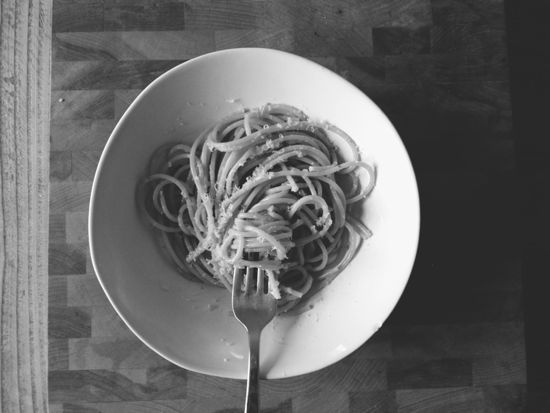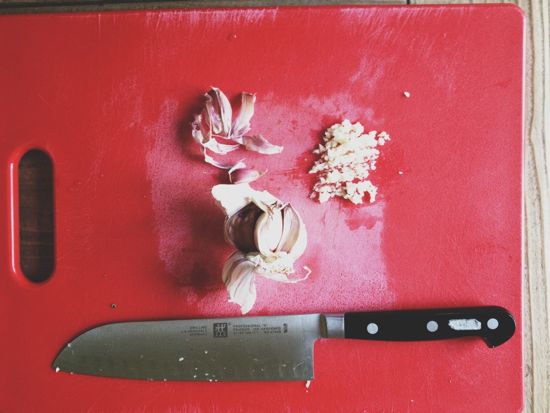On the rare occasion I find myself alone for dinner, I usually reach for one of the two ingredients that my husband finds most unappealing: anchovies and sardines. I'll happily eat sardines on toast for dinner. It's even better with smashed avocado or summer tomato slices dusted with Maldon salt. I'll make a ferocious caesar salad, adding more anchovies than when we're eating together. But there's also something else I love to eat alone, and it involves a heavy hand with garlic.
My instinct for any pantry meal, cooking-for-one meal, or dinner that I don't have to think about is almost always a variation of pasta. For this Italian, it's part of my bloodstream. Rather than fight it, my stomach tells me to give in, simmer garlic in a pan, smash the anchovies, squeeze the lemon, grate the Parmesan, and enjoy every bite.
Cooking for One
by Jake Young
I crush the garlic with the flat of the blade,
drive the heel of the knife
down in rapid strokes.
Garlic dropped in olive oil hisses,
the kitchen
pungent with the scent.
I down my drink, chew the ice.
A barred owl calls me to the open door
where streetlamps
lluminate waxy leaves. Who-who,
who cooks for you? she asks,
the garlic burning in the pan.
Reprinted with permission from the author. Check out Jake's wine blog, True Terroir.
What strikes me most about this poem is it captures so well the intensity of being alone in your kitchen. Sometimes the kitchen is bustling with little ones or friends, or you're just not having an inspired moment. It's command central, not a retreat. You're just cooking to get something on the table, not to soothe your soul. But there are nights, especially when I'm alone, that cooking can truly inspire.
We are fully present in the first two stanzas, listening to the stroke of the knife and the triumphant hiss of the garlic and oil simmering. We're living moment to moment, savoring what it means to take one ingredient and transform it into a gratifying meal.
The owl in these lines is an honest touch, and makes the poem quite relatable. It's honest because we're all guilty of talking to ourselves (or a bird, or the dog), when we're the only people in the house. It's ok to nod you head here. These are the moments that we can connect with cooking again and remember why it burns our soul like garlic in a pan.
SPAGHETTI WITH GARLIC AND ANCHOVIES
I know it doesn't look like much (beige on beige never does), but this is one of those dishes that tastes infinitely better than it photographs. At first glance, it's simply a bowl of slippery noodles, but the spaghetti is drenched in a salty, herb-laced sauce that you'll just have to take my word for.
I find the use of anchovies to be a very personal decision, so use an amount you're comfortable with. If you're unsure, start with less. You can always add more. I've also taken quite a liking to grating my garlic so it infuses better with the oil. It also avoids the problem of biting directly into a piece.
Serves 1 very generously, or two, less so
Exra-virgin olive oil
2 garlic cloves, grated
4 anchovies
Pinch crushed red pepper flakes
1/4 cup lightly packed parsley, chopped
Squeeze of lemon
Parmesan cheese
6 to 8 ounces spaghetti
Bring a large pot of water to a boil and salt it generously. While you wait patiently for the water to heat up, warm a few tablespoons of extra-virgin olive oil in a pan over medium low heat. Add the garlic, anchovies, and crushed red pepper. After a few minutes, give the anchovies a nudge with your wooden spoon, and you'll find that they'll start to dissolve completely into the oil. Let everything simmer for a few minutes more, until the anchovies are completely dissolved. This is a good time to add a pinch of salt. Then toss in the parsley, a good squeeze of lemon, and a handful of Parmesan (which has a nice thickening effect on the sauce).
Once the water is boiling, toss in your pasta and let it cook for about 6 minutes. Drain, but reserve some of the cooking liquid. Place the spaghetti back into its cooking pot, and pour the garlicky oil over the top. Pour a small amount of the cooking liquid, too, and turn the pan up to high. Let the spaghetti finish cooking in the sauce, and while it's doing so, give it a taste to see if it needs any more salt. I also add another sprinkle of Parmesan, too. When the pasta is perfectly al dente, turn off the heat and swirl some into a bowl.







